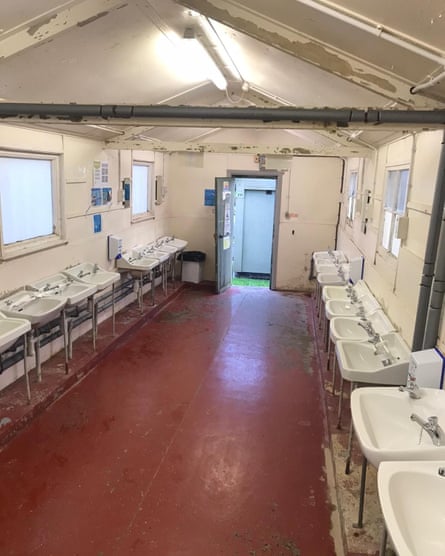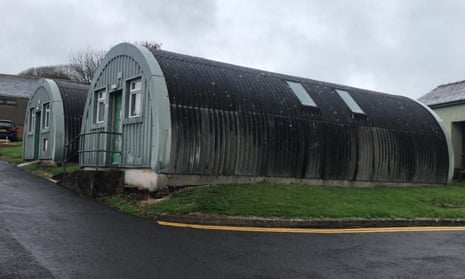The squalid conditions inside former military barracks hastily converted into refugee camps are revealed for the first time today amid mounting opposition to the Home Office move.
Images of the “unsanitary and unsuitable” living quarters inside the disused army training camps show crowded dormitories where it appears challenging to socially distance. The British Red Cross said that the Ministry of Defence sites, surrounded by barbed wire and high fences, were not fit to house vulnerable and traumatised asylum seekers who had fled conflict.
So far two sites – in Penally, Pembrokeshire, and Folkestone, Kent – which together could house more than 600 asylum seekers while their claims are being processed, have been converted.
Jennifer Blair of the Helen Bamber Foundation, which supports refugees who have endured extreme cruelty, said the pictures from inside the military camps prompted fresh disquiet.
“For a start, there’s a lack of privacy for showers and sleeping, and for survivors of rape and abuse that is unacceptable. The Welsh site in particular looks really rundown, with bunk beds and concerns over social distancing.
“It is unacceptable to house survivors of torture and human trafficking in unsanitary and unsuitable conditions. The use of barracks as refugee camps has been done without adequate risk assessment, proper vulnerability screening and specialist trauma-informed healthcare.”

Although the Home Office says nobody housed at the sites is detained, human rights groups have described them as “a prison without the safeguards of a prison”.
Chai Patel, legal policy director at the Joint Council for the Welfare of Immigrants, said the asylum seekers were subject to a night curfew and that there was “a real risk that these camps are simply another form of detention with far less oversight”.
Sonia Lenegan, legal director at the Immigration Law Practitioners’ Association, raised concerns over the apparent lack of legal access for asylum seekers on the bases and said that despite repeatedly asking the Home Office for details of any legal provision there had been no response.
She also said that charities had experienced difficulty accessing the camps because of far-right protests outside them. It follows the recent admission by a Home Office official that although they were fully aware of far-right protests outside army bases and hotels holding asylum seekers they were “not tracking” them. A welcome event to demonstrate support for the asylum seekers who have arrived at Napier Barracks in Folkestone will be held next weekend.

Other issues identified by charities include a lack of specialist mental health provision, with one Syrian doctor being transferred from the Kent camp on Friday to, according to Blair, more “appropriate accommodation”, after he suffered a breakdown.
Jon Featonby, policy and advocacy manager for the British Red Cross, said many of the asylum seekers may have been imprisoned by their government or non-state actors in their country of origin and that being held indefinitely inside such bases would not be healthy.
“We certainly don’t think this is a suitable place for people to be in accommodation. It is very concerning. It is very concerning,” he said.
The Dyfed-Powys police and crime commissioner, Dafydd Llywelyn, recently called on the Home Office to apologise for the hasty conversion of the Penally site, saying there had been a “lack of planning, communication, consultation and information”.
Last week, Priti Patel, the home secretary prompted dismay among human rights groups after calling the asylum system “fundamentally broken” and promising new laws to curb what she described as “endless legal claims” from refused asylum seekers.
A Home Office spokesperson said: “We take the wellbeing of asylum seekers extremely seriously and have taken every effort to ensure the MoD sites in Kent and Pembrokeshire are sanitary and enable people to follow social distancing.”
They added that there was no curfew, asylum seekers could “come and go as they please” and they had access to legal and mental health support 24 hours a day through a helpline.
